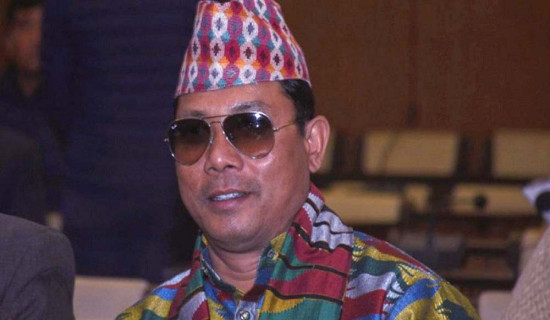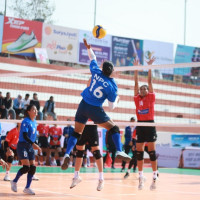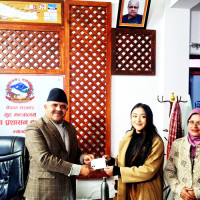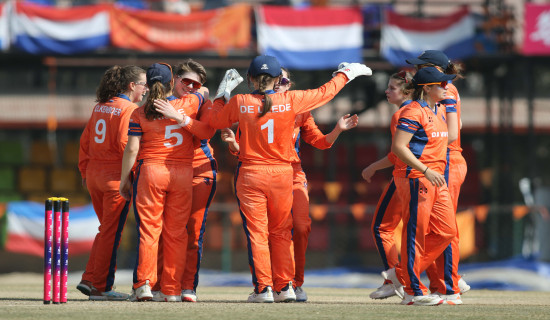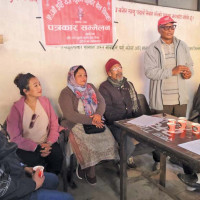- Friday, 23 January 2026
Buddha Ra Bhikhari: A new experience in Nepali theatre
Kathmandu, June 10:‘Buddha Ra Bhikhari’ (Buddha and Beggar), an enchanting folk tale of the Buddha, directed by Anil Subba and adapted into a drama by Chetan Angthupo, is now being staged at Mandala Theatre, Thapagaun, Kathmandu.
Unlike traditional plays where characters perform live in front of the audience, ‘Buddha Ra Bhikhari’ employs meticulously crafted puppets to convey the narrative.
The captivating use of shadow puppetry to tell the story based on the profound philosophy of Gautam Buddha which tend to address life's unanswered questions is one of the unique features ever used in Nepal.
This unique approach can be enjoyed by individuals of all ages, reminiscent of watching a film on the projector.
The play evokes nostalgia for the audience who used to hear folk tales from their grandparents, stressing the beautiful bond between generations.
At the first glance, the play may look like a cartoon, as it tells the story through puppet characters. However, the story's essence is skillfully presented through the art of puppetry.
The play revolves around a beggar (Bhikhari) who lives by begging. One day, the beggar notices that a mouse is pilfering the rice he had collected. The frustrated beggar then tells the mouse to steal rice from the houses of the rich, not from a beggar. Surprisingly, the mouse responded, “Each of us has our own destiny. I shall eat what is provided by fate, and the same is applied to you.” The mouse also advised the beggar to seek answers from the Buddha if he did not believe him.
Filled with curiosity and captivated by the mouse's profound response, the beggar is determined to unravel the mysteries of destiny. Motivated by a newfound purpose, he sets forth on a transformative journey, eager to seek answers from the Buddha Himself.
The journey of the beggar begins and the audience could see clouds, mountains, rivers, tortoises, sun, houses, and trees displayed skillfully by the puppeteers, who control the movements and expressions of these puppets while providing voices and dialogue for the characters.
Composed specifically for the play, director Subba gives a musical touch to the storytelling, playing a pivotal role in captivating the audience for over an hour.
The adept use of puppets to depict the beggar's journey is enthralling, leaving the audience curious about the beggar’s experiences and eagerly anticipating the Buddha's response to his questions.
Along his journey, the beggar happens to spend a night in the house of a wealthy couple whose daughter is unable to speak. The mother also urged him to seek an answer from the Buddha why their daughter could not speak.
The beggar also meets a magician with extraordinary abilities but is unable to reach heaven despite making efforts, and a tortoise aspiring to become a dragon.
These encounters, presented in a beautiful and occasionally humorous manner, elicit laughter from the audience and further encourage the beggar to seek enlightenment from
the Buddha.
The play's use of the eastern Nepal accent helps create a strong connection between the audience and the story, enhancing the overall experience.
Lighting plays a prominent role in the play, with the audience seated in a dark room, eagerly awaiting vibrant lights that skillfully narrate the story and engage the audience.
Despite shadow puppetry being an old theatrical practice in other counties, it is a new and experimental approach in Nepal, deserving appreciation for the team's efforts.
‘Buddha Ra Bhikhari’ offers a unique theatrical experience in Nepal, presenting the classical folktale of Buddha's philosophy in a manner that even children can comprehend.
The play's team deserves recognition for their remarkable efforts in creating this experimental approach to shadow puppetry, revitalising a traditional practice in Nepal.
Presented by Chulachuli Theatre of Ilam, the play is continued to be staged at the theatre until June 15.



